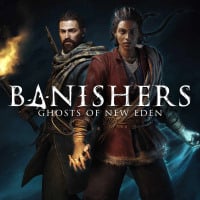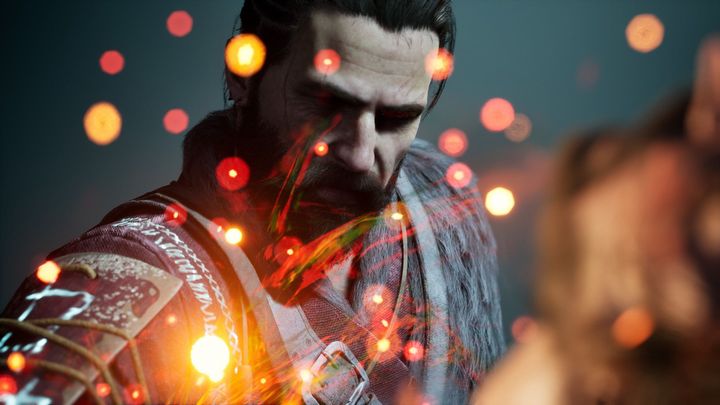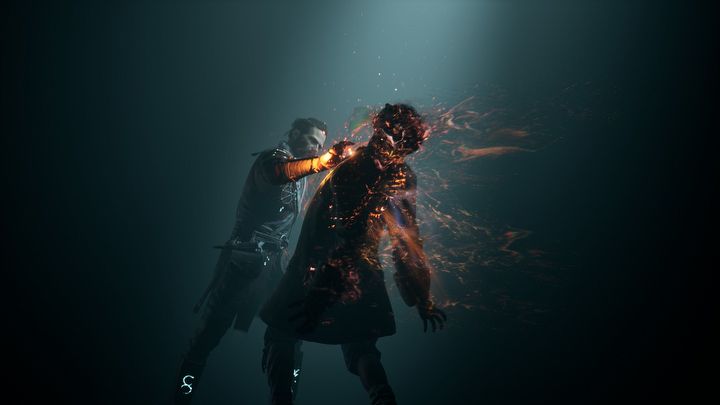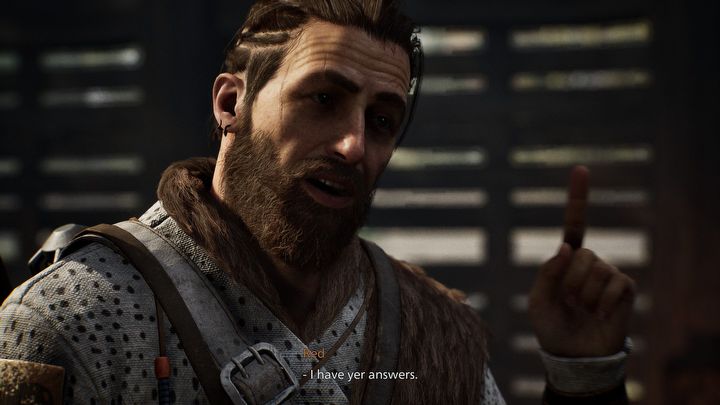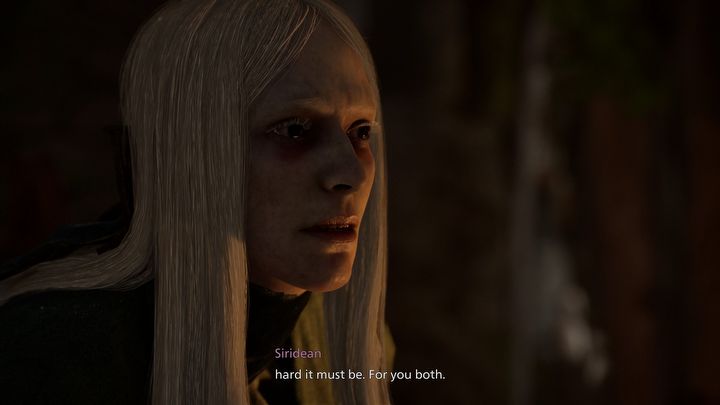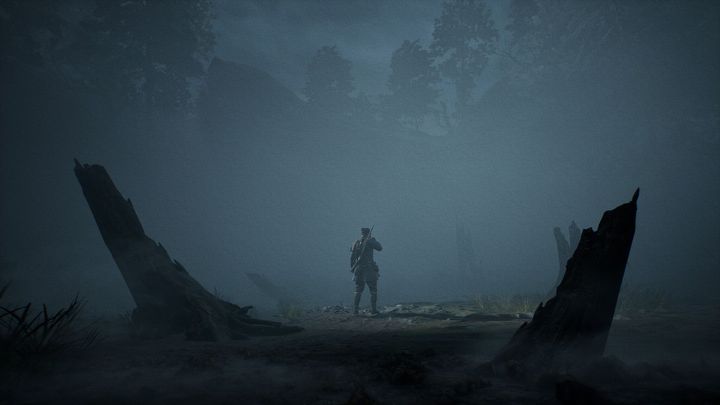Banishers Ghosts of New Eden Review: Great Game Where Humans Are More Scary Than Ghosts
If you don't play Banishers, it will haunt you until the rest of your lifes. Don't Nod has created a really good action RPG focused on story that makes a comment about the not-so-happy beginnings of the United States.
The review is based on the PC version. It's also relevant to PS5, XSX version(s).
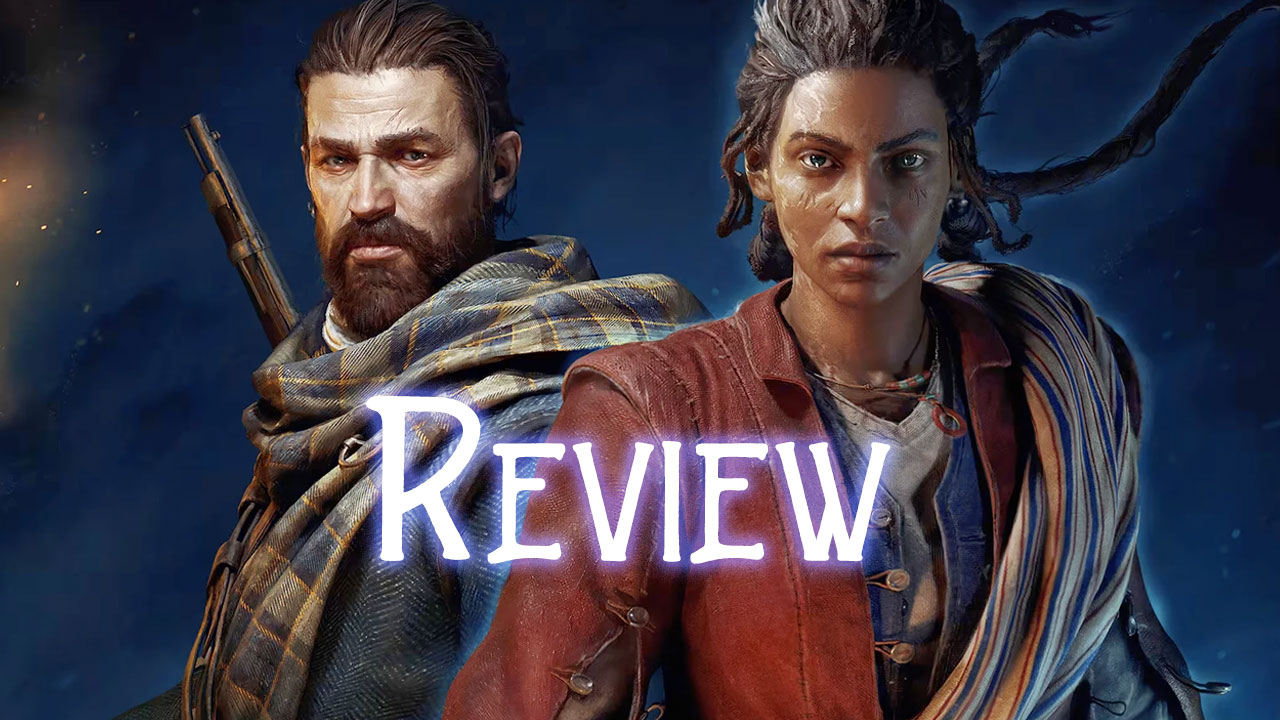
I didn't wait for the Banishers. The latest game from Don't Nod Studio, the devs behind Vampyr from 2018, unexpectedly swept me off into one of the most enjoyable adventures I've had in virtual worlds in 2023 and even 2024. This is a double–A game that, with its level, scope, and ambition, exceeds budget limitations, sometimes even intimidating much more expensive AAA games. Perhaps the French developed one of the best games of this year.
I'm not a fan of Vampyr. I couldn't stand the low budget that peeked out from every aspect of the game – dialogues, acting, gameplay, and combat. I thought the game's cool concept and the ambition to bring back the glory to somewhat overlooked vampires (at least in gaming) were unsuccessful, even though I know that the game has fans. I just couldn't jump onto that train, and I was disappointed. That's why Banishers didn't excite me before its release – I watched the trailers and thought, oh, just another average action game with RPG elements, which will get stuck in the quagmire of a weak plot, irritating combat mechanics, and will brag about choices that don't really matter. Damn, I didn't even plan to write this review. However, everything changed when I first launched the game, and it was one of the most fascinating and pleasant surprises in my gaming experience.
New world, old ghosts
Banishers: Ghosts of New Eden invites us to America in 1695, long before the United States was formed – in Boston, where although it already existed, no one had yet thrown tea into the water, and Thomas Jefferson, Benjamin Franklin, and George Washington weren't even born.
- great main story;
- and even better side haunted cases;
- the devs are not afraid to raise uncomfortable and difficult topics;
- setting with witches and ghosts as in Salem;
- voice acting and acting is really good
- difficult moral choices
- huge world
- correctly executed combat
- which, however, lacks variety
- despite the large map, exploration is based on traversing corridors
- budgetary limitations
At that time, North America looked entirely different from how we know it today. This is a land where myths and magic still exist, where the spirits of the dead walk among the living. Colonialism and European settlement lead to many wars and conflicts, whether with the native population or other colonists. It's a dark and mysterious world, but also naturally hostile. Furthermore, upon arriving in America, Europeans brought with them not only what they considered to be civilization, science, technology, and money but also less remarkable aspects of civilization: greed, arrogance, prejudice, religious fanaticism, and bigotry. Amid the hardships and labor of developing settlements, frequently on the bodies of the natives, they build their enlightened cities without realizing that they are nourishing the demon in the process. Yes, in Banishers, America isn't a beautiful, polished, and safe founding myth taught in schools. Instead of courage and progress, you'll find obscurantism, ignorance, hatred, fear, and death. If you enjoy films such as The Crucible or The VVitch: A New–England Folktale, and stories of witches from Salem and New England still give you chills, then Banishers will make you feel at home, taking us to fictional settlements located near Boston, Salem, and New England.
We come to such a land haunted by ghosts on one side and by projections, fear, and colonists' complexes on the other. We step into the roles of Red Mac Raith and his mentor, teacher and lover, Antea Duarte. We are Banishers – people who are involved in the perilous task of expelling ghosts from the world of the living. We were called by our friend for help in dealing with a plague tormenting the residents of the town of New Eden, which has a paranormal origin. On the spot, it turns out that our friend was killed by a ghost. We soon face a confrontation that I can't fully describe without spoilers, so you'll have to trust me when I say that we quickly delve into the depths of these dark, sinful lands and attempt to unravel the mystery, confronting various evil spirits. Before us is an investigation that will explain the origins of the plague, during which we will make moral choices (sometimes extremely difficult) and send back a host of murderous ghosts.
Open world corridor
Banishers is another representative of the action RPG genre with an intriguing, extensive storyline and a focus on combat. So, we end up on a huge map where we explore settlements, villages, and camps filled with collectibles, crafting materials, and other treasures. The map, although large, like in other games of this genre, contains a lot of blockades, so the exploration of the world is strongly dependent on the progress of the plot. Over time, as we unlock new abilities, we will learn how to, for instance, break down walls or clear overgrown vines, thus paving the way for further exploration, treasures, countless discoveries, and side activities. You may be familiar with this style from many other games, as Banishers indeed brings to mind titles like Vampyr, God of War, A Plague Tale: Requiem, and Dark Souls. I write "brings to mind," but you need to understand – this isn't an open world in the sense of Assassin's Creed or even Horizon Zero Dawn. In Banishers, we constantly move through corridors – when we go through a forest, it's by following designated routes. The map has many branches concealing treasures and side activities, but Banishers primarily involves linear exploration. However, don't be afraid, because fortunately, you won't experience any loading screens.
Banishers borrows blockades from God of War, and campfires from soulslikes that serve as places to rest (yes, there's an enemy respawn), upgrade equipment, level up characters, and fast travel. However, this game isn't a soulslike in any way – the difficulty level won't crush you (to be honest, throughout the entire 35 hours it took me to complete the game, I died only about 2 times on normal difficulty) and there's no need for grinding. I only rested by the fire when the game required it, as the healing flasks (estuses) are replenished after more difficult clashes.
Deadly duo
We travel through the world with two protagonists, between whom we can switch at any time for the majority of the game. Truth be told, Red is our main character and it's primarily with him that we will initiate battles or dialogues. Antea, on the other hand, has access to the spiritual world – she can guide us through some hard–to–reach places and support us in battle. Each character has a skill tree and extra equipment that can be exchanged and leveled up using crafting materials. This equipment affects seven available attributes, such as strength and agility. Attributes are crucial and affect the number of health points or damage dealt, both in direct fights and in more magical ones.
I was afraid that the combat in Banishers would be affected by the same budget constraints that led to clumsiness in Vampyr. Don't Nod put a great deal of effort into this aspect, and while it's certainly not God of War or Dark Souls, it doesn't push us away from the game, and we quickly learn to overlook its shortcomings. Sure, you can feel the limited budget, but you can really get into it – especially when we unlock the musket, which I just loved to use (although I don't know why it reloads almost like a shotgun). The combat definitely needs more options – there's a light attack, heavy attack, dodge, parry, and special attack after charging the bar and switching to the second character. This isn't enough. Although we change our equipment for a better one, it doesn't change our moveset at all, thus at a certain stage of the game you may just feel tired of it.
Perhaps there's also a lack of challenge – as I mentioned, I didn't die too often. Even the bosses, often impressive, don't present a challenge, and the ways to defeat them are repetitive. The enemies could be also more diverse, with a wider range of opponents beyond just ghosts, gray, green, and purple entities. The combat in Banishers, while passable and potentially satisfying, could benefit from further development.
Side stories that aren't filler
However, Banishers shines in a completely different aspect, and you can probably guess which one. The main and side stories, as well as the relationships between the main characters and NPCs, will be what keeps you glued to the screen. The main theme is skillfully woven into this distinctive setting, familiar from American stories about ghosts and witches. While the story lacks extraordinary turning points, it's simply well–executed and encourages us to further exploration with its atmosphere. The relationship between the two main characters is difficult, but beautiful and authentic. It is the relationship of lovers who must come to terms with loss. Their conversations during the journey are excellent, including banter, jokes, and reminiscences. We quickly become attached to them because they seem extremely lively and human.
The fact that they are Banishers only strengthens this message. In this world so densely inhabited by spirits, they are extremely needed, but that doesn't alter the fact that they are approached with reservation, fear, and even reluctance (associations with witchers are absolutely appropriate). Red is a Scot, and Antea is from Cuba – America surprises, fascinates, and terrifies them. On this very foreign land their relationship will be put to the test.
The main plot is accompanied by side quests, which in the game are called hunting cases. These are the stories of the residents of New Eden, which Don't Nod didn't do hastily. I observed nearly all of them with at least curiosity, and sometimes I let out a load "wow." Don't Nod used a clever, seemingly inconspicuous trick here – there are no NPCs in the town with whom you can't converse, and there are no puppets or fillers that populate cities known from Assassin's Creed. Each character has their own name and surname, history, profession, etc. In this way, Banishers makes us understand that we are entering a small, local community where everyone knows each other. That's why the settlements appear so empty – it creates an extra sense of desolation and makes the ghost tales more believable. Sometimes, I used to run through such a settlement without meeting anyone, as the few NPCs who survived the ghost invasion were occupied with something in their homes.
Side quests aren't as "side" as other games have led us to believe. Many of them touch upon the main thread, and even complement and clarify it. This is a great idea that makes us want to complete them all, and there are plenty of them. Often, the stories of side characters tie together several storylines and allow us to better understand their motivations. The developers weren't afraid to tackle difficult topics – ones that you rarely encounter in games. They are often difficult stories about violence and trauma that we will have to heal. For instance, the first one touches on the subject of cannibalism out of hunger. Later on, without spoilers and speaking in very general terms, you'll find yourselves dealing with the dirt of family relationships, the challenges of marriages, betrayals among friends, unhealthy ambitions, or cowardly behavior. The motivations of the frightened and the frightening are diverse and well-written.
Cases involving ghosts follow a similar pattern – we learn that a particular resident is being haunted by a spirit. Then we must find clues that will help us understand who is haunting him. Later, we collect clues to understand the ghost's motivation. In the end, when we understand everything, we can conclude the matter by making choices. The choices from Vampyr make a comeback here, but in Banishers they appear to be more... painful.
What kind of pizza are you?
Depending on the situation and the number of residents involved, the game offers us different choices: we can gently convince the spirit to leave, or we can brutally drive it away. However, we can also kill the person haunted by the spirit, because the spirit doesn't completely scare someone without a reason...
Our choices, as it's commonly said, matter, but not in the way you think. This isn't Detroit: Become Human, and the gameplay doesn't branch out; on the contrary, no matter who we kill and who we save, everything is heading towards the same outcome. Some characters will comment on our actions, while others won't, and at times, the game will show us a video explaining how our choices impacted a specific local community. However, we soon realize that the decisions we make actually accumulate to trigger one of several (five) game endings. In other words, it's similar to simple quizzes, where you need to add up answers a), b), and c), and depending on which answers are more frequent, the result will be different.
You may consider this a flaw. In my opinion, it was the same in Vampyr, but in Banishers, the devs conceal the "illusory" nature of these choices with compelling narrative and character relationships. The choices in the main thread are similar, although we will have a harder time making up our minds because these choices will also involve pillars of society – people who, despite their flaws and traits for which we would most like to send them to hell, keep communities alive. So will you kill someone who, although is or was a monster, not knowing at the same time whether it will pose a threat to the residents he was taking care of? The challenge of making decisions in Banishers is exactly that, and I have to admit that the developers have managed to make me step away from the screen and carefully consider the matter several times before making a decision. Awesome!
Ghost in the game
I didn't wait for Banishers, and I didn't expect the game to be such a pleasant surprise for me. It's a wonderful and quite long adventure, filled with side stories. After closing the case and banishing the ghost, you may receive a continuation quest, which checks on what's going on with a specific settler. It's a pity that there's no end game, as after finishing the story, there are still plenty of side activities left on the map (clashes, discoveries, treasure maps) and quite a few quests.
I didn't wait for Banishers, and I didn't expect the game to be such a pleasant surprise for me. It's a wonderful and quite long adventure, filled with side stories. Banishers is a game haunted by the ghost of satisfaction – satisfaction from good gameplay and a great story. I want more.
You can find all of our reviews on Metacritic and Opencritic.
Throughout my entire playthrough of Banishers, my mind was consumed by one thought: Focus Entertainment, for heaven's sake, pour a ton of cash into Don't Nod so that they can develop a AAA sequel in the future. Because the only thing that really took me out of the game was the limitation due to budget constraints. The animation of talking characters could be more, well, animated, and the combat more diverse. The game also contains "by design" errors, such as the inability to attack the opponent without jumping over the obstacle (before entering the arena). The devs have earned the right to develop a game that could potentially rival the best story-driven action RPGs. Banishers is a game haunted by the ghost of satisfaction – satisfaction from good gameplay and a great story. I want more.
Banishers: Ghosts of New Eden
Banishers Ghosts of New Eden Review: Great Game Where Humans Are More Scary Than Ghosts
If you don't play Banishers, it will haunt you until the rest of your lifes. Don't Nod has created a really good action RPG focused on story that makes a comment about the not-so-happy beginnings of the United States.
